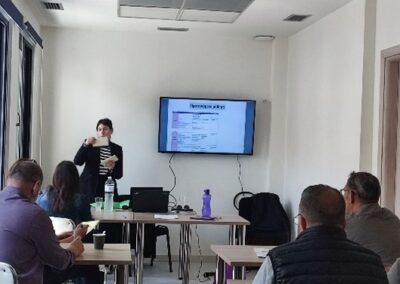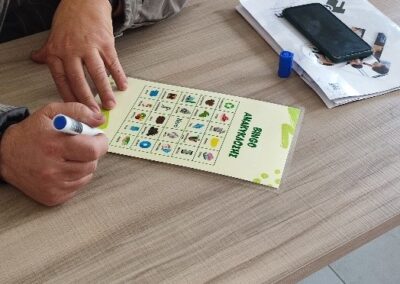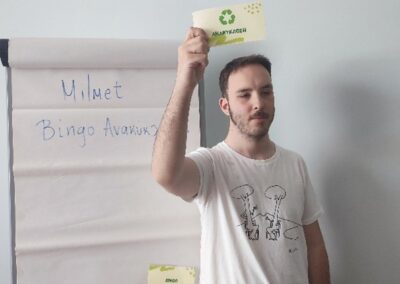What happens at Bingo stays at Bingo!
“What happens at Bingo stays at Bingo!” Patras (Greece)
That’s a quote that completely summarises our experience during the workshop of DAFNI KEK in Patras, Greece, with our target audience!
Our workshop, aimed at testing a part of our educational material and tools contributing to refugees’ and migrants’ language learning, enhancing their green skills and their easier integration into the labour market, took place on Monday 15th of May in Patras with the participation of a mixed group of learners. Our partner, Ereisma – Institute for the Development of Human Resources and Entrepreneurship, hosted us in their specially equipped classrooms, facilitated our access to the group of learners and enabled us to use their equipment. Our group of learners consisted of individuals with either a migration and refugee profile or individuals representing marginalised social groups and their designated educator. Mixed learning groups is a common practice in Greece, especially in learning environments for adult education and lifelong learning and gave us the opportunity to receive feedback from different perspectives and also test the relevance of our educational content to the specific objectives, the suitability of our learning techniques and tools for different levels of language learning and the general impact of our workshop to our group of learners in terms of engagement, interest and participation. The participation of the learning group’s trainer was also crucial for receiving the necessary feedback.
Our designated facilitators and educators, Maria and Yiannis, first informed the group of learners about the MILMET Project, its objectives and results, and the purpose and content of the specific piloting workshop. Then, they continued with the icebreaker activity, “Introduce yourself sharing a habit that causes waste”, involving the learners, acquainting them with the content and helping them focus on the learning experience. Following the icebreaker activity, learners were given cards with the recyclable and non-recyclable materials and were introduced to the parts of speech, specifically nouns, and the Greek alphabet and they were asked to categorise the materials in alphabetical order to create their own dictionary of recyclable material. Next, the learners had the opportunity to play a bingo game as a way to reflect on the learning content, memorise it, practice their listening and speaking skills, and, in general, have fun. As an assessment of the educational content, an online linking game, alphabet to word, was used.
Overall, learners seemed to get involved in the learning process and activities, either participating verbally by asking questions and repeating the learning content or non-verbally, keeping an attitude of interest and smiling, especially during the bingo game. Their engagement was satisfactory during the activities, and the educational tools seemed to achieve their objectives. Learners also seemed to understand the content, the explanations and the instructions offered to them, and they were really interested in participating in an additional workshop. Additionally, they expressed their interest in learning more about the working method of the MILMET project and about its results. The feedback received both from learners, and their educators was really useful and will be used to review and adjust our educational material. The testing of our educational tools will be continued with the involvement of more learners and educational practices.



